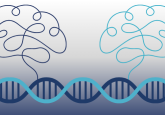Gene variants affect height in surprising ways

Low-frequency genetic variants significantly affect human height and could pave the way for precision medicine targets.

Credit: ClipArtKid
Like it or not, genetic inheritance largely determines how tall we are, albeit with some variation across different environments. Now, in a new study published in Nature, an international research team explains the role of rare genetic variants in dictating which kitchen shelf we can reach on our tiptoes.
“Height is, historically, the poster child of quantitative complex-trait human genetics,” said lead author Guillaume Lettre from the University of Montreal. “It’s a simple, robust trait that’s fairly stable as we age, and it’s almost always available in study populations. What we learn from studying height we can probably apply to other more complex human traits, phenotypes, or diseases.”
When investigating complex-trait conditions, prior genome-wide association studies successfully located DNA changes between healthy and unhealthy individuals. However, translating these associations into drug targets or other precise applications remains challenging. To bridge this gap, this new study focused exclusively on DNA changes that alter proteins.
“Both rare and common variants, and variants both inside and outside the coding region, all influence the inheritance of height,” said fellow lead author Joel Hirschhorn from Harvard Medical School. “Our results identify some new genes as being important for human growth, such as STC2, which serves as a brake on normal growth.”
Lettre and Hirschhorn collaborated with over 300 researchers across 5 continents to measure 250,000 genetic variations in 700,000 participants. The team discovered 83 new genetic variations. Worldwide, these rare variants may alter the height of 1 person out of every 1000 or 10,000. Although this contribution may seem inconsequential, Lettre cautions against dismissing its effects.
“At the population level, these variants have a small effect because they’re rare. If you do have these variants, you’re going to be two centimeters taller or shorter, so they do matter for you,” he said. Similarly, a rare variant that increases or decreases the risk of a condition like diabetes would, at the population level, minimally affect risk. “But, if you have a [disease-related] variant, you do care about your risk,” Lettre added.
Long-term, the researchers hope to translate this research approach into predictions for complex disease risk or to develop treatments for conditions such as endocrine-associated growth failure, diabetes, and schizophrenia.





